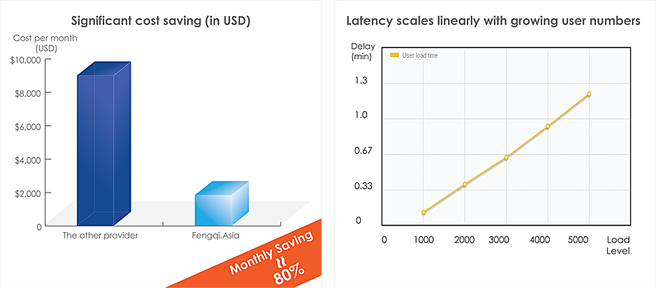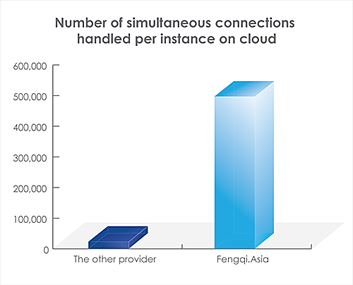Game
The Challenge
 Rapid user growth and soaring costs in I.T. Infrastructure maintenance Kidstone, once the largest print comic provider in China,
was expecting an exponential growth of active users on its online platform.
Rapid user growth and soaring costs in I.T. Infrastructure maintenance Kidstone, once the largest print comic provider in China,
was expecting an exponential growth of active users on its online platform.
The Challenge
 A highly demanding audience that always fluctuated in terms of number.
A highly demanding audience that always fluctuated in terms of number.
Yodo1 needed to provision machines with different specs on the spur of the moment to maintain low-latency delivery of mobile game content, albeit the sudden surge or drop of users.
The Challenge
 A highly demanding audience that always fluctuated in terms of number.
A highly demanding audience that always fluctuated in terms of number.
Tzai wanted a cost-effective cloud solution that offered high performance and quality support. Adding to the challenge was the Great Firewall, which significantly slowed down foreign servers.
The Challenge
 Users widely spread across Asia, growing in every area.
Users widely spread across Asia, growing in every area.
Game developer Icon Venture needed a cloud infrastructure that offered instant scalability, low latency and high uptime, thus giving them the capacity to accomodate the rapid growth in active users coming from several countries in Asia.
The Challenge
 As the popularity of Digital Chocolate's social games exploded, so did the company's IT infrastructure costs. The company had to make
sure its costs per daily active user (DAU) didn’t exceed its revenue per DAU.
As the popularity of Digital Chocolate's social games exploded, so did the company's IT infrastructure costs. The company had to make
sure its costs per daily active user (DAU) didn’t exceed its revenue per DAU.
Social game developer Digital Chocolate presented vendors with a variety of unique needs to potential cloud partners. For instance, due to the unpredictable and fragmented nature of its user base, Digital Chocolate wanted a cost-effective way to perform iterative load testing. Joyent was one of the few flexible enough to accommodate the company's wishes.
The Challenge
 As the world's largest flashcards and study games website, Quizlet felt the need to build its service on a cloud platform to eliminate
worries about hardware maintence.
As the world's largest flashcards and study games website, Quizlet felt the need to build its service on a cloud platform to eliminate
worries about hardware maintence.
How its users use the service added to Quizlet's concerns. Since its users often accessed the site from mobile devices and remote locations, Quizlet was exposed to a far more diverse set of data delivery and network conditions. As a result, Quizlet needed to quickly analyze and troubleshoot any application latencies to tune apps for high-speed page delivery.
The Challenge
 As a leading market partner in delivering games-as-a-service, Sleepy Giant was in great need of a cloud infrastructure that allowed
them to scale up or down at a moment’s notice.
As a leading market partner in delivering games-as-a-service, Sleepy Giant was in great need of a cloud infrastructure that allowed
them to scale up or down at a moment’s notice.
Sleepy Giant needed a scalable and high-performance cloud infrastructure to provide high quality experiences for gamers. In the game industry, unpredictable usage spikes occur frequently as a result of organic, viral uptake and paid promotions. When these spikes happen, it is crucial that infrastructure be quickly scaled up.
Web 2.0
The Challenge
 Zero tolerance of users on latency; below-expectation CS support from current cloud service provider
Zero tolerance of users on latency; below-expectation CS support from current cloud service provider
In the music subscription business, quick and consistent access to a vast collection of music is key to a service's success. Solition-Music was well aware of the challenges, and after being let down by its then cloud hosting service provider, turned to Fengqi Asia for a more supportive unit.
E-Commerce
The Challenge
 Target of internet attacks, resulting in service interruptions.
Target of internet attacks, resulting in service interruptions.
Leejiaju, China’s largest O2O e-commerce platform selling home building materials, was a regular victim of malicious server attack. With extra security measures, Fengqi Asia managed to help Leejiju build its service on a reliable cloud infrastructure.
An eCommerce website saves 80% infrastructure cost with Fengqi.Asia
 We helped Reebonz – a Singapore-based B2C online retailer client – to prepare for future growth. Before it stepped into Fengqi.Asia,
this shopping platform was operated with a managed hosting provider. A major challenge they were facing was that the infrastructure
failed to scale with traffic demand. Fengqi.Asia Cloud assisted the client to build a scalable architecture with our SmartMachines.
Benchmark results showed that the new platform can scale reliably with the expected business growth.
We helped Reebonz – a Singapore-based B2C online retailer client – to prepare for future growth. Before it stepped into Fengqi.Asia,
this shopping platform was operated with a managed hosting provider. A major challenge they were facing was that the infrastructure
failed to scale with traffic demand. Fengqi.Asia Cloud assisted the client to build a scalable architecture with our SmartMachines.
Benchmark results showed that the new platform can scale reliably with the expected business growth.
 More specifically, the client has reduced the computing resources from 240GB RAM (5 machines x 48 GB) for 5,000 simultaneous connections
to 24GB RAM (6 SmartMachines x 4 GB). Memcache requirement has also been decreased from 5 x 4GB RAM to 5 x 2GB RAM.
These imply an overall 80% saving of infrastructure cost. In addition, end-user latency and growing user numbers can now scales
linearly rather than exponentially.
More specifically, the client has reduced the computing resources from 240GB RAM (5 machines x 48 GB) for 5,000 simultaneous connections
to 24GB RAM (6 SmartMachines x 4 GB). Memcache requirement has also been decreased from 5 x 4GB RAM to 5 x 2GB RAM.
These imply an overall 80% saving of infrastructure cost. In addition, end-user latency and growing user numbers can now scales
linearly rather than exponentially.
Mobile Application
The Challenge
 AirHuXi is the only mobile app in China providing PM2.5 air quality index (AQI) forecast. An unpredictable increase of interest in
air pollution saw its daily download grow by 670% overnight in March 2015.
AirHuXi is the only mobile app in China providing PM2.5 air quality index (AQI) forecast. An unpredictable increase of interest in
air pollution saw its daily download grow by 670% overnight in March 2015.
Fengqi Asia provides the ability to instantly scale resources. Instead of dealing with a dramatic increase of active users leading to capacity issues, AirHuXi was able to focus its energy on product development. Within 6 months, they expanded their forecast coverage from 20 cities to 180 nationwide.
A mobile application uses ONE Node.js SmartMachines to replace a cluster
 Before operating with Fengqi.Asia Cloud, a mobile app developer required a cluster of 20-30 instances on a public cloud to support
200K-300K concurrent connections. This complicated cluster architecture resulted in high cost of development and administration.
Before operating with Fengqi.Asia Cloud, a mobile app developer required a cluster of 20-30 instances on a public cloud to support
200K-300K concurrent connections. This complicated cluster architecture resulted in high cost of development and administration.
Fengqi.Asia Cloud helped the client to replace the connection layer with Node.js SmartMachine. This modification only took 1 engineer-week to complete all the related code changes and testing.
After switching to Fengqi.Asia, benchmark results showed only ONE 1GB RAM Node.js SmartMachine can handle over 500K concurrent connections and this has significantly reduced the number of instances the client required as well as the operation cost.